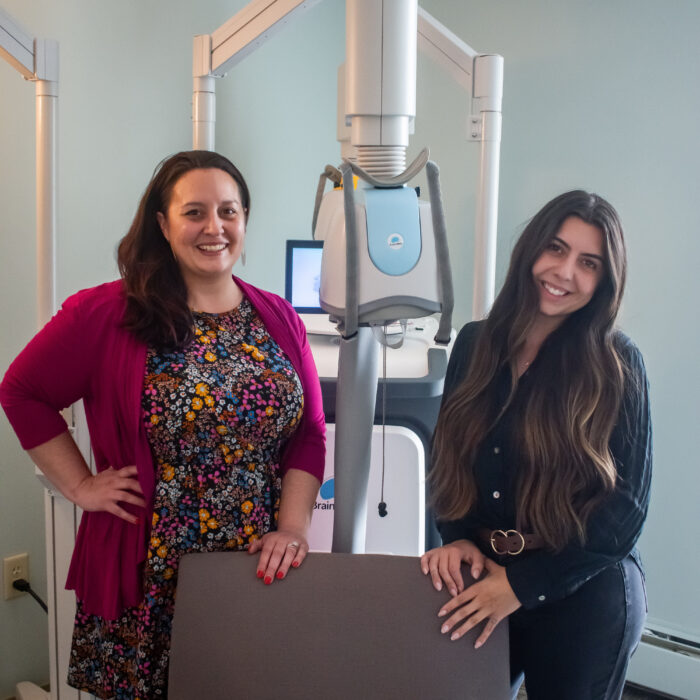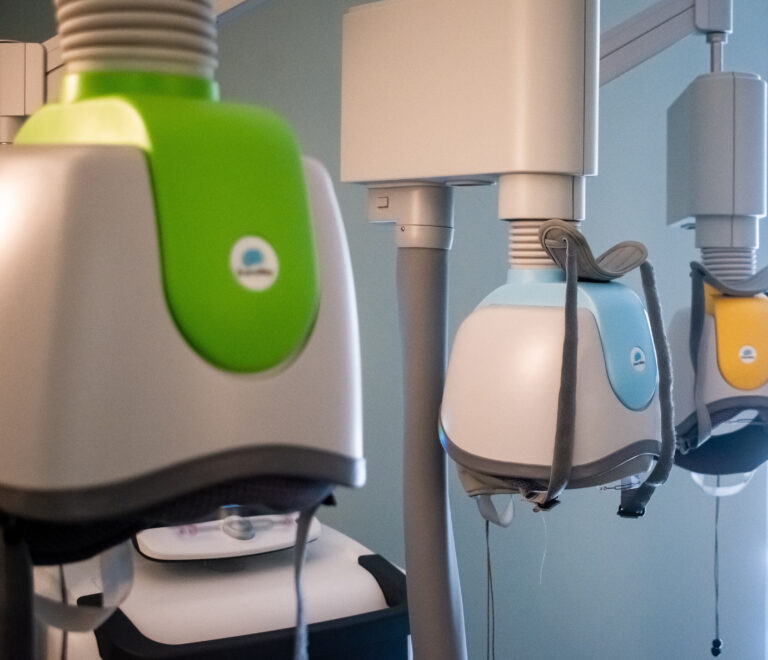TMS Specialty
Depression Treatment at Hagan Health
Transcranial magnetic stimulation (TMS) is a technology that is similar to MRI scans. TMS works better than medication for several psychiatric disorders. TMS has been a growing technology since its discovery 30 years ago. It has also been approved for the treatment of depression, anxious depression, OCD, and smoking addiction. Other conditions such as PTSD and anxiety are being treated as well. At Hagan Health, we have both Brainsway and Neurostar TMS technologies with which to treat psychiatric disorders.
In Dr. Hagan’s first career, he was a passionate neurosurgeon. Currently, Dr. Hagan is utilizing his vast knowledge and experience from that to understand the brain and the mind and to help people to be happy again with TMS treatment.
We welcome others to come and talk with us about TMS. For those who are being referred by their therapist, psychiatrist, or mental health nurse practitioner, we encourage those patients to continue seeing their providers. At the same time, we collaborate with them in a team approach.
Video Testimonials

Ashley Crawford, TMS Coordinator, Peer Support Specialist
She has 8 years experience in the mental health field and has been with Hagan Health for 4 years. She has taken on many roles prior to becoming the TMS Coordinator. Ashley is enthusiastic about TMS and built our program to what it is today. Her personal experience, passion, and peer support training make her invaluable to the team. Her hope is to break the stigma and help others with mental illness or addiction overcome their obstacles. When she is not working she enjoys being with her family, enjoying nice weather outside, and traveling to different places.
The numbers reflecting the success of TMS (transcranial magnetic stimulation) suggest that TMS is perhaps the best treatment for depression. Nationally, when patients who have not responded to medication are treated with TMS, over 80% will improve significantly, while 60% will achieve remission. That means TMS works better than medication.

Nationally, 60% will achieve remission from TMS Treatment.

Nationally, over 80% will improve significantly from TMS Treatment.

Treatment involves sitting in a comfortable chair for a 20-minute treatment, which is painless except for occasional early scalp soreness. A treater will be with you throughout every treatment..
Afterward, patients get up and leave, drive themselves and otherwise continue with their schedule for the day. There are no side effects except for rare exceptions. The usual protocol is for 30 sessions on weekdays for 6 weeks followed by a three-week taper. Insurance tends to pay for the treatment.

Frequently Asked Questions
What is the success rate?
- 80% success rate in the reduction of depression. 60% success in remission from depression.
How long should I expect to be in treatment?
- TMS is 36 sessions over 6 weeks Monday-Friday for a total visit time of 30 minutes/day.
Will my insurance pay for TMS?
- It is usually fully or partially covered by insurance. We do offer out-of-pocket rates.
Should I stop my current treatment(s) for my depression?
- You will continue current medicine during treatment and do not need to pause medicine or therapy.
Are there any side effects from this treatment?
- Side effects could include slight headache, jaw pain, and/or scalp soreness, otherwise it is non-invasive and patients usually drive themselves home. It is a painless experience.
Who will accompany me throughout my course of treatment?
- A trained and certified TMS Treater will perform your daily treatments, as well as a psychiatrist for the Motor Threshold Determination and bi-weekly check ins.
Is TMS an option for me?
Please take a few minutes to view the links below to see if you are a candidate for TMS. Please ask us if TMS is an option for you or for someone you care about.
TMS Testimonials
“I had treatment every day for 6 weeks. At first I had some soreness on my scalp, but that went away after a few sessions. I also experienced low level headaches, but nothing that a little over the counter medication couldn’t help. As I was going through the treatments I could feel the fog of depression lifting, and by the end of the treatment I was a whole new person/ no signs of depression, a gratefulness for having taken the chance on the therapy, and appreciation for Dr. Hagan and his staff. People, this is a game changer!”

“I decided to go through with TMS because after extensively researching it, I felt it had a very high probability of success and that it was the most efficient way to address my depression. One of the most important factors for me choosing TMS at Hagan Health was the responsiveness of the TMS coordinator. More importantly though, it was her compassion and lack of judgment that was clear to me the first time I spoke with her, that made me feel comfortable and safe from the outset. By the time I found Hagan Health, I had already spoken with many other providers and for the most part, the tone, flexibility, and responsiveness were very poor in comparison to Hagan. I feel very very very much better. My mood is lifting and my motivation is returning.”

“Before I went to Hagan Health I had been suffering from depression for years. After years of therapy the depression would come and go and it felt like I would never be free of the loops in my brain of constant trauma that I suffered from. But that all change when I went to Hagan Health and met Dr. Hagan and his team. They introduced me to the TMS system that I had already researched. I was skeptical at first but after a few weeks in the program I would see the change in my thinking and the way I processed my thoughts. It's been several months now. And I can say I've never been happier. The way I think is different, old habits that I felt would never go away are gone. And as I go through life others that I felt stuck in don't have the power to keep me down. Clarity and focus and awareness and the ability to process my thoughts the right way is a dream come true me after spending so many years feeling depressed.” Thank You Dr. Hagan and the Hagan Health Family

“I highly recommend the TMS treatments I received at Hagan Health. My depression has improved, and I'm glad I made the decision to go ahead with the treatments. Everyone I dealt with at Hagan Health was friendly, helpful, and courteous, making my daily visits to the clinic a positive experience. I would not hesitate to recommend Hagan Health and the TMS therapy to anyone who is suffering from serious depression.”

Before I came to Hagan Health, I had come to believe that depression was something I was going to have to live with. Once I began my TMS treatment I began to wake up and realize that this wasn't the case. The staff at Hagan Health and my TMS treatment helped me wipe away the depression leaving me with a clear slate to author the rest of my life the way I wanted it to read.

